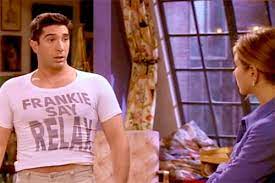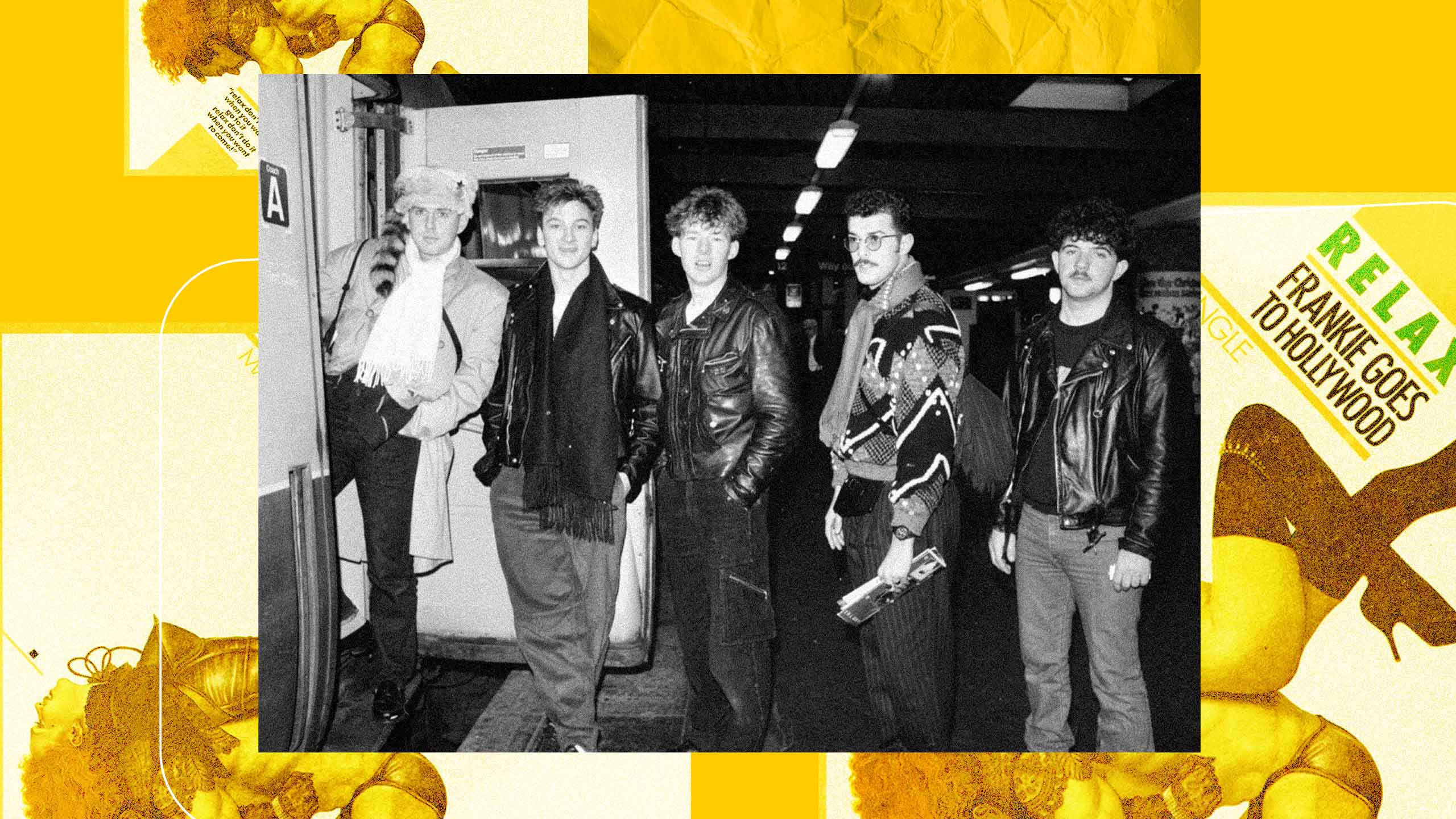If you listen to Bang!…The Greatest Hits of Frankie Goes To Hollywood or Frankie Said or any of the zillion other Frankie compilations out there, hearing all their hit singles in sequence is a welcome reminder of how genuinely provocative they were: provocative in their politics, provocative in their queerness, provocative in their working-class Liverpudlian pride.
For a brief moment at the height of 1980s Thatcherite conservatism, the biggest band in the United Kingdom had two openly gay singers, used “ARM THE UNEMPLOYED” as a T-shirt slogan and had a President Ronald Reagan impersonator quoting Hitler on the 12” mix of their biggest hit. As Marcello Carlin put it on the Then Play Long blog, “comparing Reagan to Hitler was not unknown in the non-mainstream music and contemporary art of the time, but in the middle of the marketplace it was like a nailbomb being set off.”
Named for a trip Frank Sinatra made to the West coast, the band’s first single, 1983’s throbbing “Relax,” went to the top of the charts after it was banned by the BBC, though the band denied lyrics like “Relax, don’t do it / When you wanna suck, chew it” were sexual. It remains one of the biggest-selling British singles to this day. Frankie set a new standard for merch with their “Frankie Say” T-shirts. And their equally dancefloor-friendly second single “Two Tribes” caused a sensation, too.
Both singles had the benefit of being accompanied by some seriously controversial music videos. In the original (banned) “Relax” video, band members are seen having a whale of a time in a gay BDSM club, with the straight members of the band cheering the singers on from the sideline in a perversely sweet gesture of solidarity. The “Two Tribes” video re-imagined the Cold War as a knock-down, drag-out wrestling match between Reagan and Konstantin Chernenko, then-leader of the Soviet Union. Expectations for their debut album were through the roof.
A substantial amount of credit and blame must go to Frankie’s ZTT label gurus, Paul Morley and Trevor Horn. It was Morley who engineered much of Frankie’s marketing for maximum controversy, while Horn provided them with his signature, cutting-edge production sound, that had helped propel bands like Yes and ABC up the charts. However, the magnitude of their ambitions for the group quickly devolved into egomaniac excess: Morley at one point announced that the band’s debut would be a triple-album box set (it wasn’t), and Horn generally shut the band out of the recording process in favour of samplers, sequencers and session players.
Released in October 1984, Welcome to the Pleasuredome is by no means a bad album, but it feels strangely diluted compared to the promise of their early singles. Granted, little else in the band’s repertoire hit that perfect balance of hooks and shock value the way “Relax” and “Two Tribes” did, but Pleasuredome’s sequencing does the band few favours, following the hit singles with a bunch of filler and cover songs recorded at Morley’s behest before cramming all the new material in at the very end. Rather than try to prove that Frankie had substance beyond their immaculate style, Pleasuredome made a spectacle of its superficiality, sometimes brilliantly (as on its epic, 13-minute prog-funk title track), but often in a way that betrayed how ill-prepared ZTT was to handle the monster that they created.
But a funny thing happened when it came time to record their followup: with the band beginning to stand up for themselves and Horn’s interest in them as a commercial prospect waning, they wound up with Horn’s understudy, Stephen Lipson, as a producer, someone who actually encouraged their desire to play on the record as a full band. Liverpool, the album that eventually emerged from these sessions in 1986, would be Frankie’s bid to be taken seriously.
Beyond just playing as a band and contributing only original material this time out, the album was serious in tone as well, with openly gay singer and songwriter Holly Johnson’s lyrics confronting the “wasteland” of Conservative Prime Minister Margaret Thatcher’s England head-on. Though the album title was admittedly a compromise (Johnson had originally wanted to call the album From the Diamond Mine to the Factory, the opening line of “Warriors of the Wasteland”), it gives a good sense as to who Johnson is singing for. In multiple songs he urges the masses to “rise up.” On “For Heaven’s Sake,” he addresses the rulers of the land directly: “We’ve worked for you now for too long / We’ve done what’s right, you’ve done us wrong.”
“I don’t have an instrument, I don’t have a great voice, I just have some nice clothes maybe. But, I mean, big deal.”
(Ironically, for an album that was meant to showcase the whole band, co-vocalist Paul Rutherford is less prominent here than he was on Pleasuredome—though, by his own admission, he was just as important to the band for his fabulous dancing skills as his vocal contributions. As Rutherford put it in the liner notes to Pleasuredome: “I don’t have an instrument, I don’t have a great voice, I just have some nice clothes maybe. But, I mean, big deal.”)
Bolstering this harder-edged stance is the more rock-oriented sound of the record, a stylistic choice that wound up driving a wedge between the band and the more dance music-oriented Johnson. In a retrospective piece for The Quietus, Wyndham Wallace witheringly compared the band’s attempts to rock out to Europe or Bon Jovi, but a Popdose retrospective singled out a more intriguing point of comparison: Public Image Ltd.
PiL, John Lydon’s post-Sex Pistols project, had put out their imaginatively-titled album Album just months before Liverpool, beefing up their post-punk sound with slick, heavy rock production (complete with heavy rock virtuoso Steve Vai on lead guitar!). Liverpool occupies similar terrain, and part of why it works comes down to its frontman: like Lydon, Johnson isn’t a conventional hard rock singer, and he knows it.
“Johnson didn’t quite turn out to be the new Freddie Mercury, but he makes a much better claim than most.”
Johnson’s voice isn’t lacking in power, but it’s a power that’s melodramatic, campy and grandly theatrical, a voice that’s unapologetically queer and unconcerned with rock’s predilection for machismo. He spends the first verse of the lead single “Rage Hard” crooning in an exaggerated David Bowie-esque baritone, and yelps the title of “Maximum Joy” as if the synth droplets in the background are running down his back. He may not have been fully on board with the band’s new, heavier direction, but he commits to it completely in his own way, and in doing so, Johnson wills even the album’s weaker songs to life.

And besides, to Johnson’s benefit, it’s not like Frankie abandoned dance music completely. The aforementioned “Maximum Joy” is built on a bed of shimmering, crystalline synths and cleverly spends most of its runtime teasing a bass drop that only happens in its final minute; “Lunar Bay,” the album’s strongest cut, puts a heavenly descending chord sequence over a muscular groove that bridges the gap between Frankie’s hi-NRG past and the late-’80s dance production styles that Johnson and Rutherford would explore in their solo careers.
The album ends with the lighters-aloft ballad “Is Anybody Out There,” closing Liverpool in much the same way that “The Power of Love” closed out Pleasuredome. When Johnson sings lines like “The highest price I’d gladly pay / For you to live just golden days,” it’s pure maudlin showbiz cheese, but it feels 100 percent sincere. While it’s true that there’s an occasional self-consciousness to Johnson’s newfound lyrical ambition on Liverpool (as if he’d realized, in a panic, that the provocateur role he’d cast himself in was quickly becoming a straitjacket), the total ease with which he slips into power-balladeer mode makes a winning case for why he was born to be a star. Ned Raggett once wrote that Johnson “didn’t quite turn out to be the new Freddie Mercury, but he makes a much better claim than most,” a comparison that seems predicated more on them both being gay than any similarities in their singing voices. But in the moments when both singers address their audiences directly, you can see the similarities more clearly. Like Mercury, Johnson is a born entertainer whose ultimate goal is to uplift, and he sings the word “we” as if it’s meant to include every single person in his audience.
Johnson and Mercury were also similar in another, more unfortunate respect: in 1991, the same year Freddie Mercury passed away from AIDS, Johnson learned he was HIV-positive; he began writing his memoir, A Bone in My Flute, with the understanding that he didn’t have long to live. Luckily, he’s still with us. The same year his memoir was published he released the single “Legendary Children (All of Them Queer)” in celebration of the gay icons who inspired him.
The rest of the Frankies are with us, too, and all of them have continued making music in some form or another, together and apart, in the years since their 1987 breakup. In a 2013 interview, Rutherford teased that he has a finished solo album waiting in the vaults, one which he called “the most revolutionary thing I have ever written.”
Hyperbole? Maybe. But we never loved Frankie for their modesty.


 Why you can trust Xtra
Why you can trust Xtra


